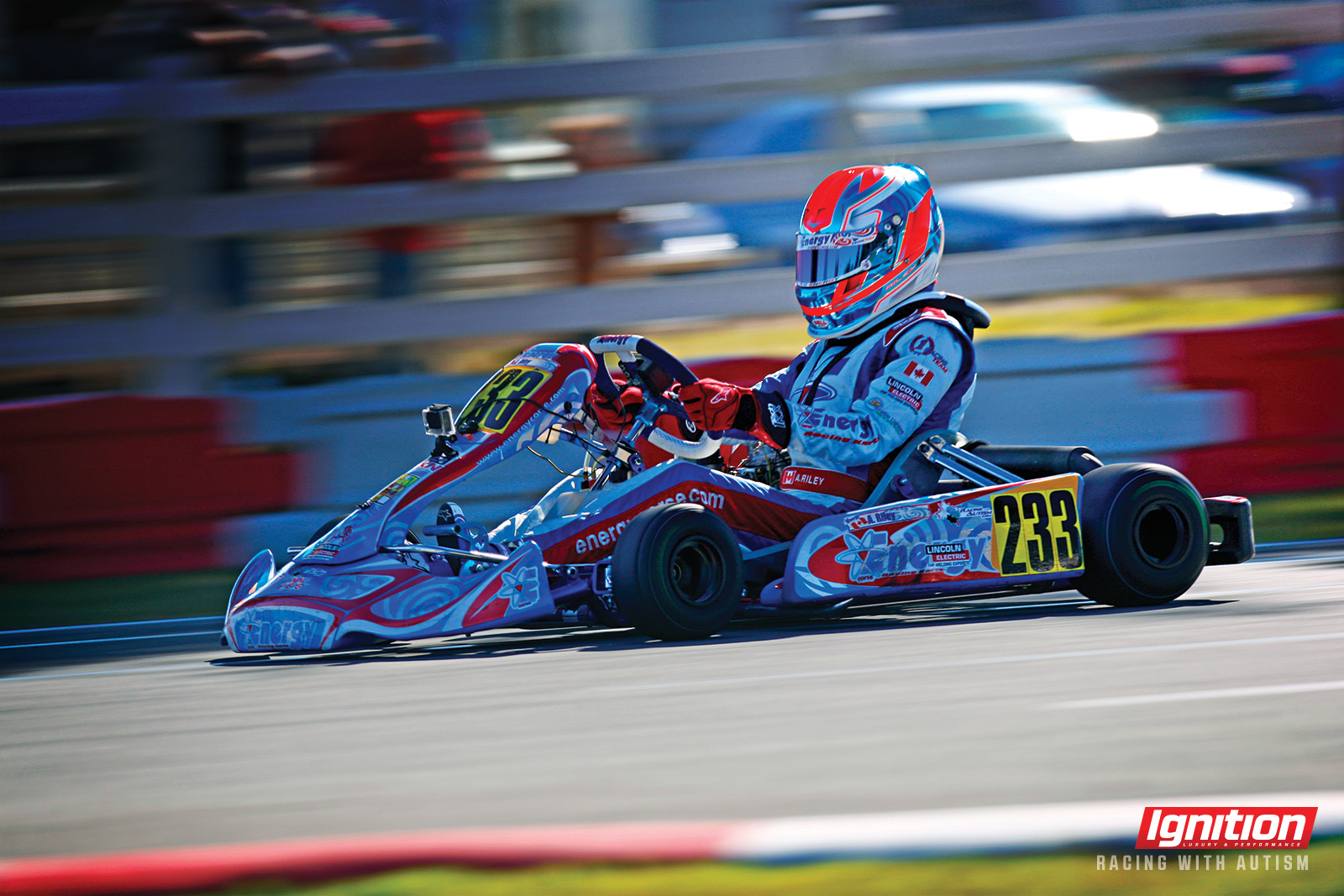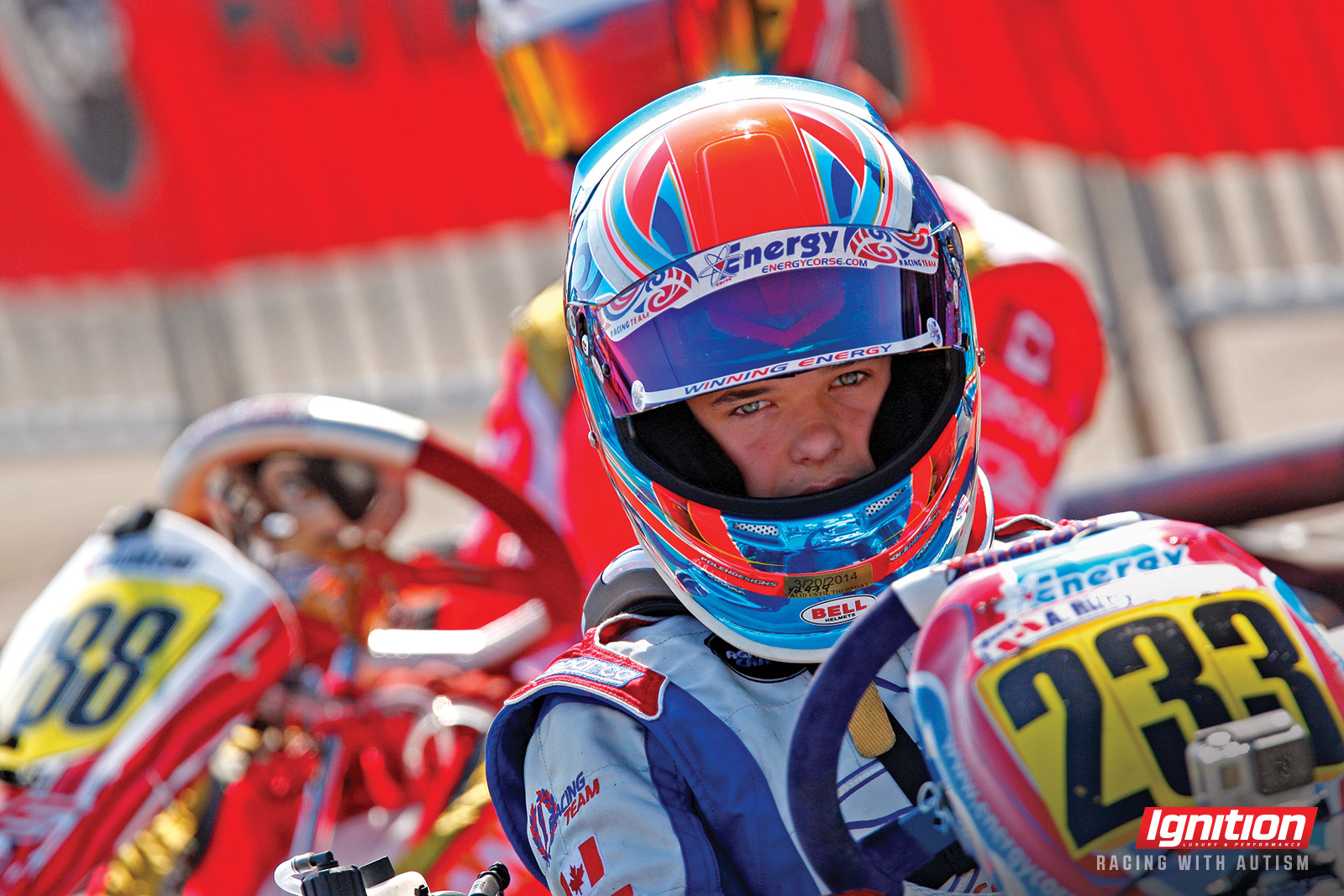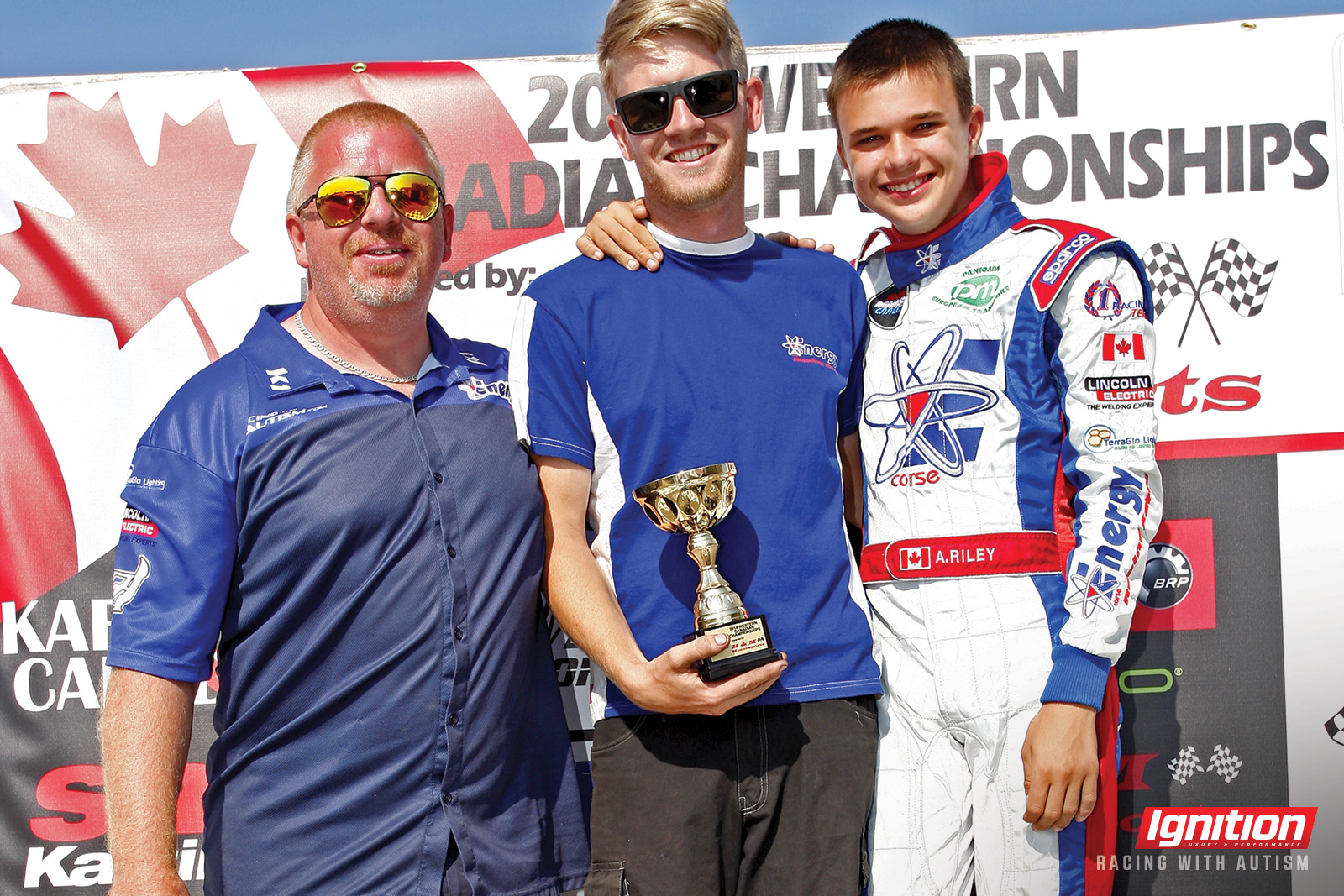
Austin Riley of Uxbridge, Ontario, is a 16-year-old kart racing champion.
He’s also autistic.
Though Austin is high-functioning on the autism spectrum, he struggles in loud and social situations – like racetracks – and still needs help securing his helmet and tying his shoes.
But when he pulls his kart out on course, he races wheel-to-wheel with the best, and leaves the spectators on the sidelines with mouths agape from amazement.
“When we got the diagnosis that Austin had autism, we thought life was going to be difficult and there was no future,” recalls Austin’s dad Jason Riley.
But instead of feeling sorry for themselves, the family decided to seek an outlet for the high energy and level of focus that accompany Austin’s disability, one that could give him confidence and enrich other aspects of his life.
Jason remembers a brief sojourn into soccer that saw Austin kick a goal and then sit down on the field begging to go home. When they found karting, an activity that Austin could excel at and would also engage in with vigour, they knew they’d happened on something magical.
“It’s all he thinks about, dreams about, is driving something,” Jason says.
And he’s legitimately good. His mechanic and driving coach, Curtis Fox, has been working with young karters at all levels for years and puts Austin’s talents on par with those of much greater privilege.
“A lot of these kids have million-dollar budgets where they have an engine builder working for them and a driver, coach and a mechanic, and their parents get to sit back and watch,” Fox says.“Austin, he elevates himself to the level of kids who have much more support and have been proven in big races throughout the world. He’s able to run right with them.”

At 16, Austin has already won three club-level championships and recently advanced into DD2, which he’s excelling in even more.
“We put Austin in it for the first time and he looked more comfortable in that than he did in the go-kart he had been racing for three years previous,” Jason says. “Every time we speed him up he looks more comfortable because the kart is actually moving at the same speed as his mind. It’s an amazing thing to see.”
The point about Austin’s mind moving quickly may not resonate with those who think of disability as equating to slowness, but it’s one that others who know Austin agree on.
“How I see Austin is his brain works so fast,” says Jessica Benge, an Australian education assistant specializing in disabilities. She has a competitive kart racing history of her own, and her disability work in Australia won her a scholarship to work overseas. Those two interests converged after she learned about Austin via his Facebook page, Racing with Autism, so she chose to use her scholarship to come to Canada and become Austin’s personal caregiver to help nurture his development in racing and otherwise.
“The faster Austin’s world is, the more comfortable he is,” Benge says. “If the world can keep up to his pace then he’s going to be much more comfortable with life."
“In saying that, it’s not like that for every person with autism. Once you’ve met one person with autism, you’ve only met one person with autism. They’re all extremely different, and they all have different talents.”
The discovery of Austin’s passion for racing has changed life much more dramatically for him and his family than any of them could ever have imagined.
“It definitely takes him out of his comfort zone,” Jason says. “It puts him in an environment that’s very noisy. There’s lots and lots of people – some he knows, some he doesn’t. It helps him grow as a person. We’ve found over the last three or four years Austin’s growth has all come from being in this situation, and the only reason we can put him in the situation is because he loves to do it more than anything in the world. He has to take the bad with it because he loves it so much.”
Benge says his social skills in particular have made a noticeable improvement.
“Watching him at the racetrack with his racing friends and the conversations that he has with them compared to the conversation that he has with people at school, which is basically nothing, it’s improved so much – short yes or no answers compared to a whole conversation about a certain car or about the race or about the go-kart that he’s driving. I see Austin at school and in different situations where he really struggles, and then he goes out on the track and completely just blows everyone away.”

But working with Austin in a racing environment comes with unique challenges. Fox says Austin has become like a little brother to him over the roughly two years they’ve been working together, and yet communication can sometimes be a barrier.
“When he comes off the track, if I ask him if the handling was good he’ll just be like ‘Yep, it was fine,’” Fox says. “He won’t try to extrapolate what’s actually happening. Even though there might be a problem, he’s just having fun driving it and he’s not going to expand on whatever the problem may be."
“If the engine is not exactly running right or the gear is a little bit off or the handling isn’t perfect, he isn’t able to fine-tune adjustments with his feedback like most drivers would. “I do a lot more of our coaching with a GoPro, and I make him sit beside me and I go through the proper racing line or any mistakes he would have made. He really absorbs that well."
“And for tuning, the kart has an onboard data acquisition system that reads speeds, RPM, g-forces, temperature, exhaust, water, and I have to focus on that a lot more to get optimal performance out of the kart. But his driving does most of it.”
Austin’s story is no doubt inspirational. After hearing from families of autistic children around the world about how Austin is changing perceptions of what people with autism are capable of, the Rileys decided to take up their biggest challenge yet and take that inspiration on the road.
From this April to June, Austin, Jason, Jessica and Curtis carried out a cross-continent tour that saw them visit racetracks and schools across North America to share Austin’s story with others. They met a heroes’ welcome and left an impression behind at every stop they made from Florida to California, up into British Columbia and across into Manitoba, expanding Austin’s racing experience and spreading awareness along the way.
“Whether they have disabilities or not, there are still lots of kids who are shy or unsure of themselves and are not very confident,” Jason says. “If maybe Austin could inspire another family or another child with autism to get out of their comfort zone and try something, it will be worthwhile.”
Benge sees spreading the word of Austin’s successes as important not only for his own development but also for furthering the cause of people everywhere living with disabilities.
“He will change many people’s minds about the capabilities of people with autism,” Benge says. “He’s changed my life, and I’ve worked with lots of people with autism."
“People who have not-great thoughts on people with autism, I can’t imagine how he’s changing their opinions.”






















